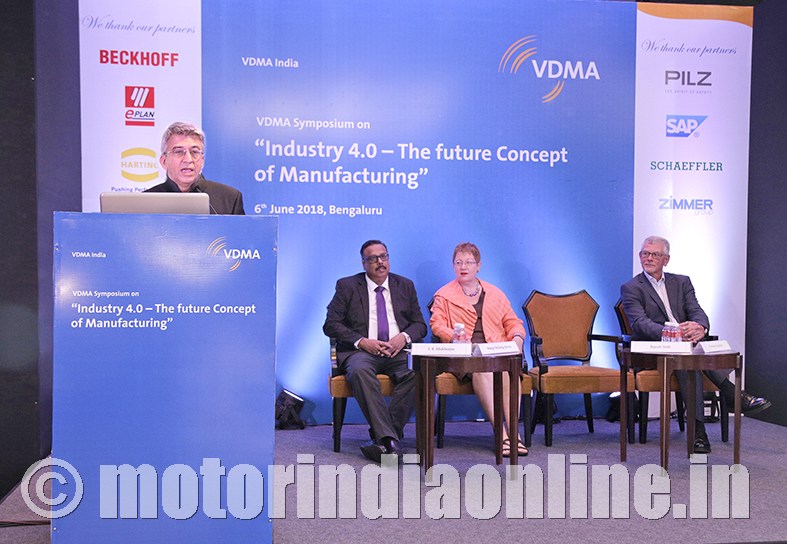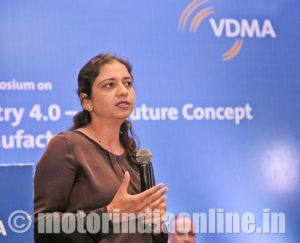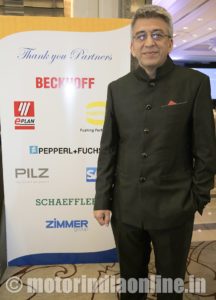A new query in the age of Industry 4.0 is whether the data or the consumer is the king!
This, akin to the chicken or the egg first puzzle, is but one of the many foundations on which the Industry 4.0 concept works. The speakers at the VDMA Symposium on ‘Industry 4.0 – the future concept of manufacturing’, organized early June, talked about how to get the best out of this concept using successful case studies from the European markets, especially Germany.

Mr. Rajesh Nath, MD – VDMA India, touched upon the need for Indian industry to come up to the mark. He felt implementing the Industry 4.0, first as a mindset and then as a workable concept, is the urgent need of the hour.
He said: “It is widely felt that Industry 4.0 is for large companies. We want to change this thinking. It is also for the mid-sized companies which can gain significantly by applying this. Secondly, we wish to show the applications like remote monitoring among others on how they can benefit the manufacturing sector.”
In total there were representatives from eight companies who spoke about different aspects of automation in the manufacturing sector, including themes such as implementation of Industry 4.0 in India, challenges and the way to handle them in its implementation, digital transformation in the manufacturing sector and making Industry 4.0 a workable and result-oriented concept and the like.
Consumer is the king
Mr. Ravi Agarwal, MD – Pepperl & Fuchs Factory Automation, for one, was convinced that the consumer is the king. When asked about the ‘modern’ riddle, he opined: “The consumer is the king because it is his/her preference which is driving the goods and services, and that is how Industry 4.0 enables the customer preference to reach the far end of the loop which is the manufacturer.”

Citing how the German economy is fuelled heavily by automotive makers and drawing a close analogy to the Indian scenario, Mr. Agarwal explained at length: “Owning fewer vehicles means less pollution, but then Germany’s economy, technology and development plans will change. And that’s what is driving them to look at how to use information. In the Indian perspective, how does Industry 4.0 make a difference? Unlike Germany, India has an entire gamut of industries. The connect between, say, agricultural produce and Industry 4.0 is that if the demand from the market and the stock levels are known, then a consistent supply, better procurement price and payment to the farm produce can happen. Also, by using remote sensing from the satellites, we now know in which corner of India what crop has been sown and its maturity level on a daily basis. So, we can easily decentralize our food processing industry and take it to where the crops are grown. That way the farmer gets better procurement pricing and the peripheral industries like canning and transportation can become more efficient.”
According to him, with Industry 4.0 we can pre-assess, monitor, protect our crops, and down the supplychain we can take that crop to processing in the minimum amount of time. The same is applicable to other manufacturing industries as well so that the consumer gets served better and the manufacturing sector can become precise.
Data is the king
Ms. Ekta Arora, VP – IoT and Digital Supply Chain, SAP Labs India, was of the opinion that it’s the data which makes the world go round.
She shared: “In 2015-16, Indian industry had witnessed 15 per cent growth. IoT has enabled positive change in productivity where reimagining new business models and processes is now possible. It helps in managing and mitigating risks. Availability of data 24/7 from people and machines helps us make informed decisions, and today the basic expectation is – prediction in advance.”
Using an example from the logistics sector, she shared: “Once the freight is dispatched, tracking or changing the route based on, say, the weather is only possible using data.”
According to Ms. Arora, each logistics company has a need to simplify its processes and own a consumer-centric attitude because inevitably people, logistics, manufacturing industry and machines are all connected to a network because all impact and counter-impact each other.
Industry 4.0 and automotive industry
No industry is left untouched by technology. In Mr. Agarwal’s words, ‘the line of distinction between the industry, their types and sizes is being mitigated’.
He said: “In the automotive industry, vehicles, in particular cars, have 12-16 computers on board, and that is increasingly needed because car owners want safety, comfort, fuel efficiency or better climate control. If all these controls in the vehicles are smart, the question is – are they being manufactured using a ‘smart’ process? If any control needs fixing, then it means that the way it is produced, tested, installed and maintained when it goes back to the workshop has to be in the same league.”
Industry 4.0 as a concept is all about helping Indian industry rise to the global challenges and volatile market developments. VDMA hopes that through platforms like its symposium it can usher in a golden period for the manufacturing sector to become ‘smart’.
“Industry 4.0 can be a win-win if the industry and the academia come together”
Excerpts from the exclusive interaction with Mr. Rajesh Nath, MD – VDMA India: Indo-German endeavour
Germany has been progressive in Industry 4.0, so VDMA wanted to create an awareness about it in the manufacturing sector in India also which can gain significantly using this concept. The sector can utilise remote monitoring of equipment for their benefit since there is the advantage of predictive analysis of possible failure of the equipment which can then be rectified even before the failure has occurred. In Inudstry 4.0, it is a combination of man, machine and data and how all the three are integrated and used for the benefit of the industry.
Industry 4.0 and automotive manufacturing
The benefit of remote monitoring is aptly applicable to the automotive sector also. In fact, one can say it is critical for this sector because a breakdown can lead to avoidable delay and loss in production which can be minimized to a large extent using Industry 4.0 if we can get the data beforehand to analyze.
India’s readiness
India is still at a nascent stage. The awareness of Industry 4.0 is being witnessed in India, but only gradually, and symposia like this are valuable to spread the message amongst the industry on how it can benefit the manufacturing sector.
Key recommendations
The crucial point, which the Government is also aware of, is that we cannot do away with automation. As the processes are getting more and more complex, automation would certainly gain more ground in India too. Of course, we will always have the conflict on how to employ people, but I think it is more like shifting employment from one area to another while automation itself will give birth to new avenues for employment.

It is also important to formulate regulations, especially in cyber security, because we are talking about a huge collection of big data. Unless this data is secure, people would be hesitant to embrace it confidently. It is commendable that the Government is taking initiatives in finding a good fit between the industry and academia which would be a win-win situation for all the stakeholders involved.
